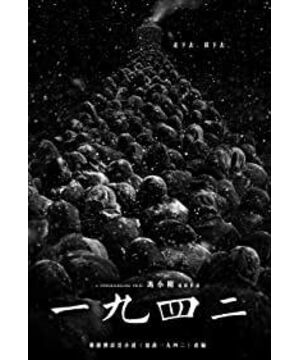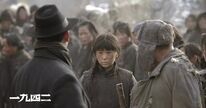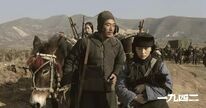Under the supervision of Liu Zhenyun, the film restores the language, attitude and character of Henan people very realistically, which can be said to have both form and spirit. Just like his "One sentence is worth 10,000 sentences", Henan people must be able to cut the language system in their minds into Henan dialect patterns very naturally when reading, and each sentence seems to be uttered by the people around them. The same is true of this film. If you put me and the people around me in the film, in the same situation, we will say the same thing and do the same thing. For the people of Henan, the resonance of the characters' portrayal makes the film's sense of substitution so strong that although there are many bad reviews, it is difficult for me to feel that this film is not good.
Liu Zhenyun always emphasizes the sense of humor of Henan people when talking about the film, which is also his consistent argument. In the actual viewing of the film, it can be found that his concept has been well implemented: although the film is very sensational, and like a TV series, it is unskilled and can not be explained directly. Similar to "Tangshan Earthquake", it lacks technical content. ; But the solid script ensures that the actors in every sensational scene can come up with a very characteristic cold humor, which shows a rare restraint and lifts the film from the level of TV dramas a lot. For example, an old man had a fever before he died and said, "It's good to have a fever, it's warm when you have a fever." ”. Time and time again, Liu Zhenyun's tears were choked back by laughter. With his assurance, Feng Xiaogang has improved from "The Great Earthquake". In fact, from Zhang Yimou to Chen Kaige, good screenwriters have played a key role in each of their films, and Feng Xiaogang is no exception.
Regarding the sense of humor of Henan people, Liu Zhenyun tried his best to describe a chat method called "Spray Kong'er" in "One Sentence Worth Ten Thousand Sentences": "Something that has a shadow, something that doesn't have a shadow, one person accidentally mentions a topic, another One person will pick it up, and you will put the whole thing together.” This may be close to the local definition in Yanjin, but when it comes to other parts of Henan, the meaning of spraying empty space is much broader. . The sense of humor in "1942" is not quite the same as this. In most cases, it is a summary that is half serious and half self-deprecating, and it takes more seriousness. It is because of seriousness that it is even more comical. From this, I think that Liu Zhenyun may have exaggerated his so-called sense of humor: he is a relaxed person, and he has the unique sensitivity and elevating skills of a writer, and it is inevitable that he often misunderstands the seriousness of Henan people into humor. In fact, based on my personal experience and observation, we Henan people are the ones who can’t make jokes the most. When we get older, we especially lack natural external emotions. When we get along with people from other regions on a relatively broad platform, many people It takes a lot of effort to ensure that it matches the surface of the group's spiritual temperament - but in fact there is still apathy and autism in the depths; in general, the spiritual world of Henan people grows inward.
Whether it is really humorous or not, the dialogue scenes of Henan people in the film are indeed familiar to me. I'm not sure if the high-ranking officials in Henan have the same demeanor as the old fritters that Li Xuejian faces in the film, but the roles of farmers in the film are very vivid: they use cunning and slick words to maintain their decency, and they can speak well. What I think in my heart is very realistic; most of the time, there is a kind of simple coldness, and the warmth and kindness that burst out in extreme situations seem to be overflowing - these are the human experiences that I have perceived since I was a child. I don't know why, but these experiences seem to be scarce now. Every time I go home, I feel that the fields and villages are different from the past; the crowd has been isolated by the small concrete buildings, the old people sit quietly in the houses, and the young people rarely appear in the village. Young and powerful people rush left and right in the anxiety of achieving success, some can maintain a bit of vigorous momentum, and many continue to grow in calm despair as they grow older.
So now, what was it like in the past? I can't even tell. In my childhood hometown imagery, the fields and villagers burst out with savage vigor, while my father and several uncles were full of vigor and confidence, their eloquence shone with ideal light, and their energy was so high that it seemed like it could be built tomorrow. their own empires; heaven and earth are opening for them, and all things will make way for them. After all, my village was still young.
View more about Back to 1942 reviews











